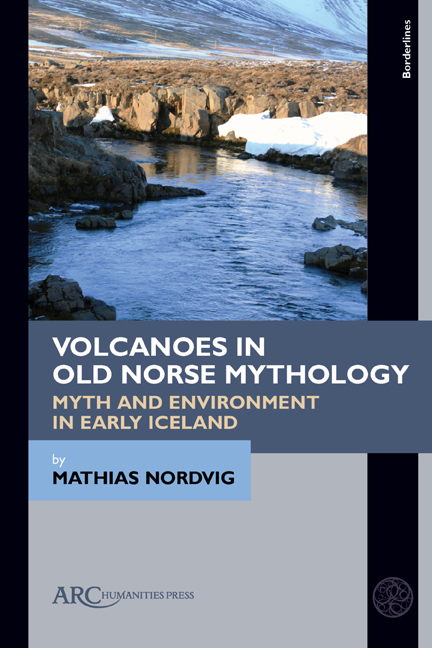Book contents
- Frontmatter
- Contents
- Introduction
- Chapter 1 Old Norse Mythology Between Environment and Literature
- Chapter 2 An Indigenous Theory of Volcanism in Iceland
- Chapter 3 Volcanism in Old Norse Cosmogony
- Chapter 4 Volcanoes in the Social Order of Old Norse Mythology
- Chapter 5 Volcanoes as a Cosmological Principle in Old Norse Mythology
- Bibliography
- Index
Chapter 4 - Volcanoes in the Social Order of Old Norse Mythology
Published online by Cambridge University Press: 13 April 2021
- Frontmatter
- Contents
- Introduction
- Chapter 1 Old Norse Mythology Between Environment and Literature
- Chapter 2 An Indigenous Theory of Volcanism in Iceland
- Chapter 3 Volcanism in Old Norse Cosmogony
- Chapter 4 Volcanoes in the Social Order of Old Norse Mythology
- Chapter 5 Volcanoes as a Cosmological Principle in Old Norse Mythology
- Bibliography
- Index
Summary
THE COSMOGONY IN Old Norse mythology is reflected in several myths. Some reference the primordial rift between Æsir and Jǫtnar in context of volcanism. The myth of the mead of poetry in Snorri's Edda contextualizes this rift in a referential relationship to the creation myth and demonstrates the social-cosmological order in the volcanic landscape. It suggests that the mead of poetry has capacities as a ritual item of social memory that also refers to volcanism. With referentiality to both the creation myth and to Ragnarǫk, it points to a connection between social and environmental collapse, and that volcanism is a foundation for group competitiveness in early Icelandic society. The myth about Þórr's duel with Hrungnir further expands on this complex, yet in this myth it is Hrungnir who threatens the Æsir, representing both a volcanic menace and a competitive out-group. Together with one another these myths suggest a cosmology in early Iceland that is predicated on environmental disruption from volcanism and group competition for resources. Each myth suggests geologic processes and points to risks of social collapse through group competition.
The Mead Myth
The mead myth appears in the Eddic poem Hávamál 104– 10, in multiple references in skaldic poetry, and in prose in Snorri's Edda. Scholarly analyses focus on its role in relation to knowledge and alcoholic drink in Old Norse mythology and religion. This complex presumably has its origins in the distant Indo-European background to Old Norse mythology. Jens Peter Schjødt has argued for a connection to cosmology in the mead myth in “Livsdrik og vidensdrik.” Carolyne Larrington has done the same in “Vafþrúðnismál and Grímnismál: Cosmic History, Cosmic Geography.”
Larrington notes that by ingesting the mead in Grímnismál, Óðinn gains the capacity to perform a mapping of the cosmos, which prescribes proper social conduct.5 In Grímnismál 45 Óðinn invites all the Æsir to join the feast and drink the mead. Larrington argues that this action “plots the boundaries of the human and the divine, laying bare the ritual and sacrificial structures which underpin both the worlds of Ásgarðr and Miðgarðr.” Schjødt points out how the spatial structures of the myth represent cosmic functions.
- Type
- Chapter
- Information
- Volcanoes in Old Norse MythologyMyth and Environment in Early Iceland, pp. 73 - 118Publisher: Amsterdam University PressPrint publication year: 2021



